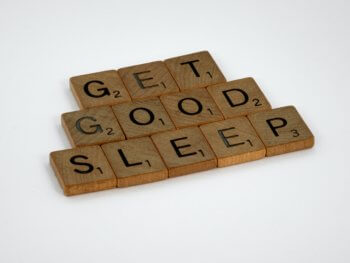‘Tis the season to be … tired? Then it’s time to face the facts about fatigue. Let’s look at what’s making us tired, how fatigue impacts our lives, and what we can do to get back on track.
Dr. Monica Vermani is a Clinical Psychologist specializing in treating trauma, stress and mood & anxiety disorders, and the founder of Start Living Corporate Wellness. She is a well-known speaker and author on mental health and wellness. Her upcoming book, A Deeper Wellness, is scheduled for publication in 2021. Please visit: www.drmonicavermani.com.
Dr. Vermani has recently launched an exciting online self-help program, A Deeper Wellness, delivering powerful mental health guidance, life skills, and knowledge that employees can access anywhere, anytime at www.adeeperwellness.com.
What’s the big deal? We’re all burnt-out, frazzled, and sleep-deprived, right?
When day in and day out, we’re not getting enough rest and pushing ourselves to keep going long after we should call it a day, we’re not only risking our health and safety, we’re putting our relationships with friends, family, and co-workers and our work in jeopardy.
Why We’re So Tired
We can become fatigued for many reasons. There may be underlying physiological or psychological issues or nutritional deficits in play. For example, people dealing with depression or other mental health issues often struggle with sleep. As well, people dealing with respiratory problems, cardiovascular disease, diabetes, and many other common physical conditions can find themselves fatigued. But most of us need not look any further than our lifestyles, habits, and choices for the cause of our fatigue.
For optimal sleep health, adults 18 to 60 years of age need between seven and nine hours of sleep each night. Teenagers require an average of 10 hours per night. An astonishing 50 percent of Canadian adults have trouble getting to or staying asleep and struggle with staying awake throughout the day.

The Impact Of Fatigue
When we are constantly running on empty, we are less than our optimal selves on many fronts. Besides the physical, physiological, and cognitive impacts we experience when we are fatigued, our relationships take a big hit. We are less able to meet the demands of our waking lives. Our cognitive abilities are diminished. We struggle to take in new information and cope with problems as they arise. Our moods are negatively impacted.
Our ability to regulate negative emotions, like anger, could impact anyone we encounter. When overtired, we are, essentially in pain. And people in pain spill over onto others, and cause pain by being overly emotional or demanding. When we are overtired, our expectations soar. We become overwhelmed by minor requests, setbacks, errors, and disappointments. Feeling depleted also brings on feelings of inadequacy. We feel unheard, let down, unappreciated, unsupported, and unloved. In short, when it comes to taking care of our need for rest, we are, at times, our own worst enemies.
From Worst Enemy To Best Friend
When we don’t have time or energy, every minor request or task feels monumental. Many of the conflicts in our lives arise when we are feeling depleted and unable to handle stress. We tend to get irritated faster and easily become reactive, demanding, disappointed, and angry. We find ourselves reacting harshly, being less forgiving, and compassionate than when we are well-rested.
Rather than being our own worst enemy by draining and depleting our energies to the point where it negatively affects every aspect of our lives, we can become our own best friend, by bringing in self-care and prioritizing ourselves.
Sleep For Success
A good night’s sleep — not just occasionally, but every night — is a good place to start. A good night’s sleep doesn’t just happen, especially when we’re used to routines that get in the way of quality sleep. You need to set yourself up for sleep success. Quality sleep requires calm, dark, and quiet.

You need to establish healthy routines before bedtime, like limiting heavy meals and exercise and turning off televisions, computers, and phones at least an hour before heading off to bed. You need also to take time to relax your mind — through meditation, a warm, relaxing bath, or listening to music, whatever you find enjoyable and relaxing.
If these measures fail, seek help. Talk to your doctor about solutions. You may be referred to a sleep clinic, or a medical specialist to identify underlying medical concerns that might be impacting your sleep quality. If you are in the midst of a highly stressful time in your life, your medical doctor might offer helpful short-term interventions, like psychotropic medications or supplements to facilitate a restful night’s sleep.
When It Comes To Priorities
Prioritize you! We often find ourselves burning the candle at both ends because we say yes to requests for help, and end up over-extending ourselves at work or in our personal lives. When we do so, we fail ourselves through a lack of self-care. We need to begin to see that over-promising to please others is an unhealthy choice.
When it comes to priorities, we need to put ourselves first, love, and value ourselves enough to make ourselves a priority. When we prioritize ourselves, we have the energy and time to tend to unforeseen mishaps and concerns that arise. We have reserves of energy and time and don’t feel overextended by what requires our attention. We can act, react and respond in calmness and kindness, not only to others but for ourselves.
Dr. Monica Vermani’s tips on how to face your fatigue.
Are you exhausted, day in and day out? If you’re running on empty, taking stock of your lifestyle, habits, and choices can help identify the problem areas in your life. You will find where you can begin to create positive changes!
- Examine your sleep habits if you have trouble falling or staying asleep. A device- and screen-free period before falling asleep is essential to a quality night’s rest.
- Take stock of what you eat and how close to bedtime! We don’t want to wake up our metabolism, we want to wind down before bed. Also nutritionally, are you over-eating or under-eating, or choosing unhealthy processed foods that may be causing you digestive discomfort and abdominal distress? Are you drinking enough water? Are you overindulging in alcohol which can interfere in sleep quality?
- Be on the lookout for energy-depleting people-pleasing patterns of behavior! Learn to say no when you just don’t have the time or energy reserves to spare. Remember to give from your overflow, not from your well.
- Seek medical advice if you’re fatigued even when you’re getting enough rest.
Main Image Photo Credit: www.unsplash.com
Dr. Monica Vermani
Author
Dr. Monica Vermani is a Clinical Psychologist who specializes in treating trauma, stress, mood & anxiety disorders and is the founder of Start Living Corporate Wellness. Her book, A Deeper Wellness, is coming out in 2021. www.drmonicavermani.com


















































































































